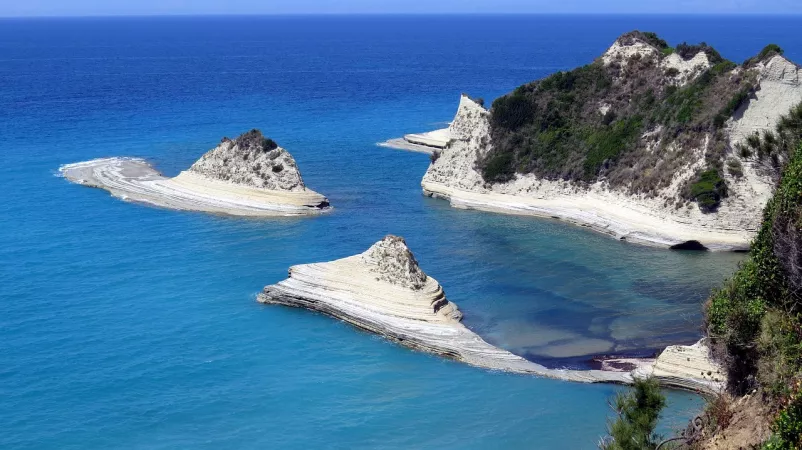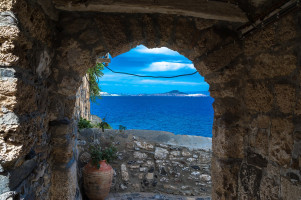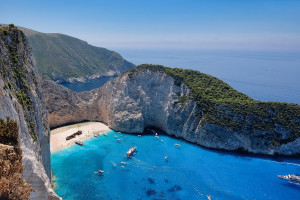
Greece
Duration
7 to 14 Days
7 to 14 Days
Best time to visit
May-Jun, Sep
May-Jun, Sep
Theme
Heritage, Beaches
Heritage, Beaches
Greece Travel Guide
Greece, located in southeastern Europe, is a country known for its rich history, stunning landscapes, and vibrant culture. As the birthplace of democracy and Western civilization, Greece boasts ancient ruins, beautiful islands, and delicious cuisine. The country is famous for its mythology, including gods and goddesses like Zeus and Athena, as well as iconic landmarks such as the Acropolis in Athens.Top Attractions in Greece
- Acropolis of Athens
- Santorini's Cliffside Villages
- Delphi Archaeological Site
- Mykonos Beaches
- Meteora Monasteries
Greece is Famous for
Breathtaking landscapes and ancient history.Top Attractions in Greece
- Exploring the Acropolis
- Relaxing on the beaches of Mykonos
- Admiring the sunset in Oia, Santorini
- Visiting the ancient ruins of Delphi
- Witnessing the monasteries perched on cliffs in Meteora
What's Great about Travelling to Greece?
- Rich history and culture
- Breathtaking landscapes
- Delicious cuisine
What's Not So Great about Travelling to Greece?
- Peak tourist crowds in summer
- Language barriers in rural areas
- High prices in popular destinations
Travel Tips for Greece
- Observe local customs and traditions
- Carry cash for small purchases
- Stay hydrated and wear sunscreen
Important Greece trip information
- Ideal Duration: 7-10 days to explore the main attractions.
- Best Time to Visit: April to June and September to October for pleasant weather and fewer crowds.
- Nearby Airports and Railway Stations: Athens International Airport and major railway stations in Athens and Thessaloniki.
Top 5 Places to visit in Greece
Total
6,17,500
*EXCLUDING APPLICABLE TAXES 5.0 Ratings
( 20 Reviews )
( 20 Reviews )
Total
1,21,900
*EXCLUDING APPLICABLE TAXES Total
1,22,200
*EXCLUDING APPLICABLE TAXES Per Person
9,92,250
*EXCLUDING APPLICABLE TAXES Total
60,000
*EXCLUDING APPLICABLE TAXES 5.0 Ratings
( 4 Reviews )
( 4 Reviews )
Per Person
1,07,320
*EXCLUDING APPLICABLE TAXES FAQ's on Greece
Q1: What is the best time to visit Greece?
The best time to visit Greece is during the shoulder seasons of spring (April to June) and fall (September to October) when the weather is pleasant, and the crowds are thinner. Summer (July and August) is peak tourist season with hot temperatures and crowded beaches, while winter can be cold with fewer tourist activities available.
Q2: Do I need a visa to travel to Greece?
Most tourists from the US, EU, Australia, and Canada do not need a visa for stays up to 90 days within a 180-day period. However, it's essential to check the specific visa requirements based on your nationality before traveling to Greece.
Q3: What are the must-visit attractions in Greece?
Greece is home to iconic attractions such as the Acropolis in Athens, Santorini's stunning sunsets, the ancient ruins of Delphi, the historic sites of Mykonos, and the beautiful beaches of Crete. Don't miss exploring the monasteries of Meteora and the ancient city of Olympia.
Q4: Is Greece a safe place to travel?
Greece is generally a safe country for travelers. While petty theft can occur in tourist areas, overall, it is safe to visit. Be cautious in crowded places, safeguard your belongings, and be aware of any political demonstrations. Avoid any areas known for civil unrest.
Q5: What is the local currency in Greece and can I use credit cards?
The local currency in Greece is the Euro (€). Credit cards are widely accepted in major establishments, but it's advisable to have some cash, especially in smaller towns and local markets. ATMs are easily found in cities and tourist areas.
Q6: What is the local cuisine like in Greece?
Greek cuisine is known for its fresh ingredients, olive oil, feta cheese, and Mediterranean flavors. Must-try dishes include Souvlaki, Moussaka, Gyros, Greek Salad, and Baklava. Vegetarians will find plenty of options like Spanakopita and Dolmades.
Q7: What transportation options are available in Greece?
Transportation options in Greece include buses, ferries, domestic flights, and rental cars. Public transport is efficient in major cities, while ferries are ideal for island hopping. Taxis are available, but it's essential to use licensed ones.
Q8: Are there any cultural norms or etiquette I should be aware of when visiting Greece?
When visiting Greece, it's important to greet people with a friendly "Kalimera" (good morning) or "Kalispera" (good evening). Respect local customs like dressing modestly when visiting churches or monasteries. Avoid discussing politics with locals and be mindful of Greek hospitality and traditions. Remember not to raise your voice or show anger in public places.
Q9: I am a travel agent. How can I buy travel leads of Greece?
Register yourself as a travel agent at agents.tripclap.com and then you can buy travel leads to Greece once your account is approved. For more details contact our support team at +91-8069186564 or support@tripclap.com








